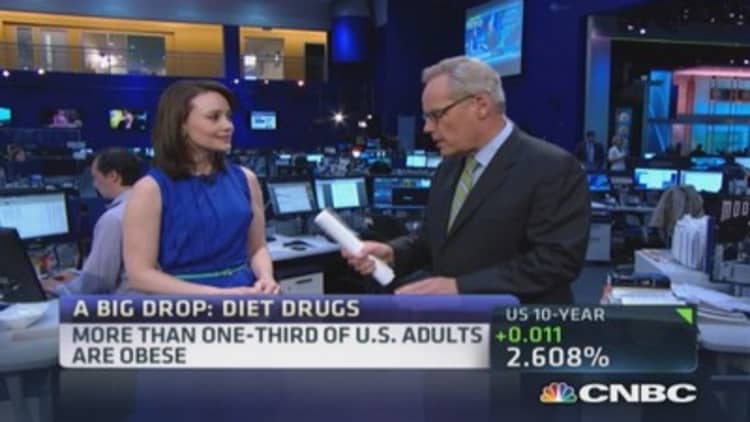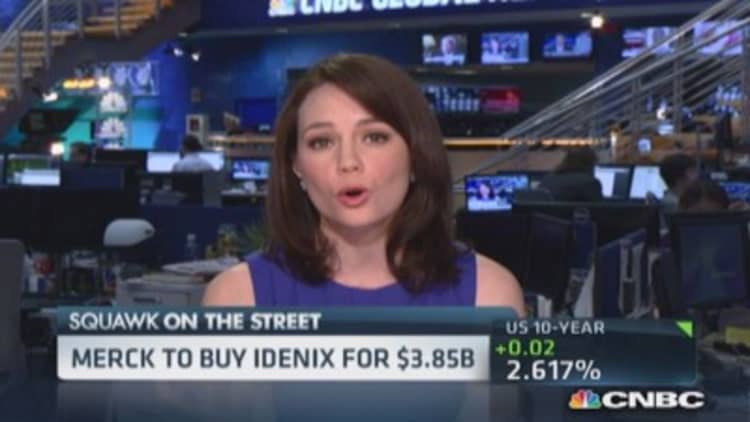
When Orexigen Therapeutics' obesity drug, Contrave (now called NB32), was turned down by the Food and Drug Administration in January 2011, it looked like the company could fall to a distant third behind competitors Vivus and Arena. Now, an FDA decision on Contrave is expected by Wednesday, and analysts say its third-place arrival on the market may actually work in its favor.
Orexigen was required to start a multiyear study on the cardiovascular safety of its medicine before reapplying for FDA approval. Meanwhile, Vivus and Arena secured clearance of their drugs, Qsymia and Belviq, in 2012. (They have to do post-marketing studies to monitor safety.)
Read MoreHow your tax dollars are making Americans fat
In a field plagued by safety concerns and development hiccups, Belviq and Qsymia were the first drugs for obesity cleared in the U.S. in 13 years. And given that more than a third of adults in the U.S. are obese, according to the Centers for Disease Control and Prevention, expectations for sales of the two drugs were high, as analysts saw a large market in need of options.
So Vivus and Arena should be going gangbusters, right? Wrong.
In the last year, Vivus' stock sunk 63 percent, while Arena shares are down 31 percent; both hurt by disappointing results. Vivus reported 2013 sales of $23.7 million for Qsymia, missing analysts' estimates in each of the four quarters (by as much as 49 percent in the third, according to FactSet). Arena, which is partnered with Japanese drugmaker Eisai on its drug, reported royalties that also missed analysts' estimates in two of the three quarters it was on the market last year.
As Piper Jaffray analyst Charles Duncan put it, obesity drugs are "a space that's been left for dead."
Why? A few reasons:
- Marketing muscle. Vivus doesn't have a Big Pharma partner to help it market its drug, and it started by targeting obesity specialists rather than the primary-care physicians who are seeing most of the patients, analysts said. Arena has Eisai as its partner, and it has serially increased the size of its sales force as it became clear uptake was a challenge.
- Safety concerns. Remember fen-phen, the combination of fenfluramine and phentermine, that was pulled from the market in 1997 after it was linked to heart-valve problems? Or Acomplia, Sanofi's obesity drug that was pulled from the market in Europe in 2008 for possible links to suicide and depression? Or Meridia, Abbott's diet pill, that was pulled from U.S. shelves in 2010 after it was tied to heart attacks and strokes? Obesity drugs have a rocky track record.
- Cost. Belviq and Qsymia cost about $5 to $7 a day, said Wells Fargo analyst Matthew Andrews, which equates to more than $2,000 a year. That's before coupons and discounts provided by the companies. And not all insurers cover the drugs, so some patients are paying out of pocket.
- The perspective that obesity isn't a disease. Though the American Medical Association declared it as such in June of last year, obesity still faces an uphill battle in being accepted as something that can be treated with drugs—rather than as a lifestyle choice that can be counteracted with diet and exercise.
So it's been tough-going for Vivus and Arena. Why should it be any different for Orexigen?
Read MoreWhy there's no end in sight for higher drug costs
Analysts, echoing communications from the company, say the cardiovascular outcomes trial Orexigen was required to run may actually give it the advantage over Vivus and Arena because it'll have more data on the safety of its drug sooner. Plus, Vivus and Arena have helped pave the way with physician awareness and reimbursement of obesity medicines. And finally, Orexigen's got some major marketing muscle in its partner, Takeda.
"Of the three, Takeda has 10 to 15 years' experience in the diabetes marketplace, and that could play to their advantage," Wells Fargo's Andrews said in a telephone interview Friday. "That, along with 900 reps, could put them in a good position to outperform Street expectations over the next year or so."
In addition, Belviq and Qsymia were designated controlled substances by the Drug Enforcement Administration, which limits how broadly they can be used—for example, in samples given at doctors' offices. Contrave is not DEA-scheduled, meaning doctors can hand out samples, analysts said.
Read More
And finally, Contrave contains an ingredient that may keep patients on it for longer, according to analysts: It's a combination of naltrexone, an approved drug for addiction, and bupropion, a commonly prescribed antidepressant.
"Bupropion, we believe, is what makes for greater persistence" of patients taking Contrave, Piper Jaffray's Duncan said. "Being an antidepressant, it can help you feel good."
Health concerns, though, surround all three drugs—particularly cardiovascular safety, the reason for the longer term studies. In addition, Vivus' drug has issues concerning birth defects if it's taken during pregnancy.

The drugs are recommended for use in addition to improved diet and exercise. Qsymia, a combination of two approved drugs—the weight loss medicine phentermine and migraine treatment Topamax—helped 62 percent of patients on the recommended dose lose at least 5 percent of their body weight, compared with about 20 percent on placebo in trials.
About 47 percent of patients without Type 2 diabetes taking Belviq lost at least 5 percent of their body weight, compared with about 23 percent on placebo (the numbers were 38 percent on Belviq versus 16 percent on placebo for those with type 2 diabetes).
Read MoreDirty baby, healthy baby? Filth may cut allergies
On Contrave, 53 percent of patients lost at least five percent of their body weight compared with 21 percent of those taking placebo.
Duncan estimates Contrave will draw $1.5 billion in total sales in 2020, compared with about $550 million for Vivus's Qsymia. Andrews estimates 2020 U.S. revenue of Contrave of $1.2 billion, including indications for both obesity and Type 2 diabetes. That compares with $481 million for Arena's Belviq and $396 million for Vivus' Qsymia, which don't have strategies to pursue diabetes, he said.
First, though, Contrave has to get on the market. The FDA is expected to make its decision by Wednesday, and analysts expect approval. Andrews puts the probability at 90 percent.
—By CNBC's Meg Tirrell

